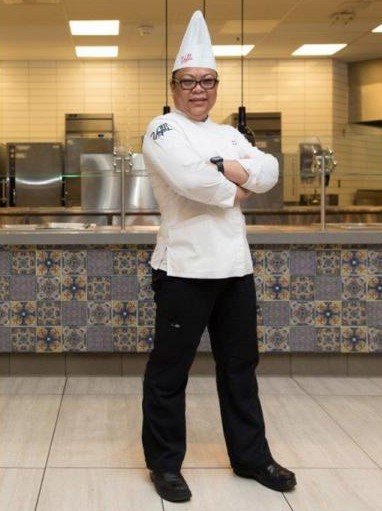Bringing Filipino Flavor to Las Vegas

In an interview with Executive Chef Kristine Raymer for Asian American and Pacific Islander Heritage Month, she talks about the influence her Filipino culture has on her career—and what her mom thinks of her cooking.
Interviewer: How did you get into the culinary arts?
Chef Kristine: Growing up, I always helped my mother cook. I loved baking, and my mom's coworkers would buy baked goods from me. That's how my passion for culinary started, but at that time, I didn't know what path existed for someone wanting to be a chef. There was a college fair in high school, and the Culinary Institute of America had a booth. I grabbed everything that I could, and attending the CIA became my focus.
Thanks to my parent’s support, I graduated from the CIA in 1998. I started my career in restaurants. I put baking aside for years and didn't go back until I was hired here at the convention center. They needed a pastry chef, and I at first said I don't do baking. Women often get these roles because men gravitate towards the hotline. I was adamant that I wouldn't do pastries, but long story short, I took the job. I was the pastry chef here for almost eight years, and I rediscovered my passion for it. I moved on to become a sous chef, and I've been the executive chef here since 2019.
Interviewer: How does your culture influence your cooking?
Chef Kristine: I was born in the Philippines. I came here at five, but I remember quite a bit. A lot of the flavors and memories still stick with me. I remember the chaos of the street vendors and the traffic of people on the street. It's like there are no rules on the road. The street vendors would have the most amazing food you'll ever experience. You can't find these flavors anywhere else. Those are the things that I miss. We've incorporated those flavors on some of our menus, especially in retail. We have traditional barbecue chicken skewers with our secret marinade. It's a huge part of Filipino culture, and we're able to incorporate it into our menu so our guests can experience a bit of our culture.
When I cook Filipino food, it's sometimes more Americanized because I put my twist on it. We have this soup that we make, sinigang. It's very tart because we use tamarind. Whenever I make it, to my mom, it tastes so much better than the traditional because I know what I like. But when I make chicken adobo, one of our more popular chicken dishes, I like it saucier with less vinegar. Traditionally, it's the opposite. My mom always reminds me that it's not quite traditional!
Interviewer: Aside from food and family, what are some other things that you would say define Filipino culture?
Chef Kristine: We love to eat and we love to throw parties and find reasons to gather. That's what I remember growing up. Every weekend, we would look forward to going to someone's house or someone coming to our house. There was never a dull weekend. Dinner wouldn't be a simple dinner. It would be a whole buffet. If the neighbor came by, they were invited over. I didn't have many Filipino friends growing up. But now that I'm older, I do. And they're the same. There's always a party, there's always an invitation. I think it's ingrained in us.
Interviewer: And here you are, feeding thousands and thousands of people.
Chef Kristine: Even though I have that culture and history behind me, I don't often look back and notice my heritage and what that brings for me, or to the people around me, or even my work. But when I think about it, that's definitely one of the reasons I've gravitated to this industry. To see a smiling face when they love your food—it's the same as when I sold baked goods as a teen. Do I still get the same feelings hearing good feedback from clients? Yeah, for sure.
Interviewer: When people think of Asian food, they tend to think of Chinese, Japanese, or Korean food. But the term "Asian American" represents so many different parts of the world. Do you feel a responsibility to introduce people to something new?
Chef Kristine: Absolutely. There are certain similarities because of all the influences within the area. The Chinese have egg rolls, and we have lumpia. The flavors are different, with fewer vegetables and more meat for us. The dipping sauce is not sweet and sour; we use a sauce called banana ketchup, but there are no bananas! The Vietnamese have the closest egg roll to a lumpia. If you had all three in front of you, you could tell the differences. We have lumpia on the menu here at the Center. In Las Vegas, people love to try different things. We get to spread our wings.
We have an employee dining room at the Convention Center, where we'll incorporate different cuisines. We've done a Filipino day, and a lot of people are surprised because they've never had it. It's nice to get those reactions and say, 'Hey, you tried something different. Maybe now you'll try the Filipino restaurant down the street.'
Interviewer: Are there any Filipino representations in pop culture or film that you would recommend?
Chef Kristine: There's a comedian named Jo Koy. He's my age, and a lot of his comedy is based on how he grew up. He made a movie called Easter Sunday to shed light on what growing up was for him. And his point was that it's really no different than what other cultures go through. There's still the family drama. It's a Filipino family, but at the end of the day, his mom is just like any other mom.